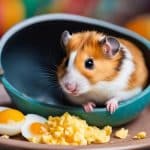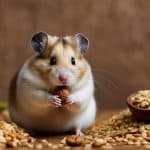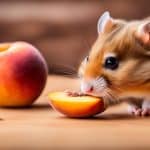Hamsters are adorable pets known for their small size and active nature. As a responsible pet owner, it’s essential to provide them with a well-balanced diet that meets their dietary requirements. Many pet owners wonder if they can feed eggs to their furry friends. In this article, we will explore whether hamsters can eat eggs, the benefits and potential risks, and how to introduce eggs to their diet.
Eggs can be safely fed to hamsters as an occasional treat, as they are not toxic to them. However, it is crucial to ensure that your hamster is not allergic to eggs. It’s also important to note that eggs should not be a staple of their diet and should only be given once or twice a week as a special treat due to their calorie and fat content.
To further understand the topic, let’s delve into the benefits and potential risks of feeding eggs to hamsters and how to include eggs in a balanced hamster diet.
Key Takeaways:
- Eggs can be fed to hamsters as an occasional treat, as long as they are not allergic.
- Eggs provide hamsters with protein, essential amino acids, and vitamins.
- Feeding eggs to hamsters should be in moderation due to their high calorie and fat content.
- Hamsters with pre-existing heart conditions should not be given eggs.
- A balanced hamster diet should primarily consist of commercial hamster food, supplemented with fresh vegetables.
The Benefits of Feeding Eggs to Hamsters
Eggs can provide hamsters with essential nutrients that contribute to their overall health. They are a good source of protein, which is necessary for the development and maintenance of a hamster’s fur, skin, and heart. Protein supports the growth and repair of tissues and helps in the production of enzymes and antibodies.
Additionally, eggs contain essential amino acids that are crucial for a hamster’s body to function properly. These amino acids help build a strong and active body, supporting muscle development and overall vitality.
Eggs are also rich in vitamins, including vitamin D. Vitamin D plays a vital role in a hamster’s skeletal health and helps in the absorption of calcium and phosphorus, promoting strong bones and teeth.
Feeding eggs to hamsters in moderation can be a beneficial addition to their diet, providing them with valuable nutrients. However, it is important to remember that eggs should not be the main component of a hamster’s diet and should only be given as an occasional treat alongside a balanced hamster diet.
Potential Risks of Feeding Eggs to Hamsters
While eggs can be beneficial for hamsters, it is important to be aware of the potential risks associated with feeding eggs to them. Although eggs are not toxic to hamsters, they should be given in moderation due to their high calorie and fat content.
Eating eggs on a regular basis can lead to obesity in hamsters, as the excess calories can quickly add up. Obesity in hamsters can result in various health problems, including heart-related issues. Hamsters with pre-existing heart conditions should not be given eggs, as the cholesterol and fat content in eggs can potentially exacerbate their condition.
It is crucial to closely monitor a hamster’s calorie intake and ensure they maintain a balanced diet. Feeding eggs occasionally as a treat is recommended, but they should not become a staple of the hamster’s diet. Including other nutritious food options, such as fresh vegetables and commercial hamster food, is essential for maintaining a well-rounded hamster diet.
Introducing Eggs to a Hamster’s Diet
When incorporating eggs into a hamster’s diet, it’s crucial to do so gradually and with careful consideration. The following feeding methods are recommended to ensure the well-being of your furry friend:
- Small pieces of scrambled eggs: Cook scrambled eggs without adding any seasonings or oils. Cut the cooked eggs into small, bite-sized pieces that are easy for your hamster to consume. This method provides a soft texture that hamsters can easily chew and digest.
- Hard-boiled eggs: Boil an egg until it is fully cooked. Allow it to cool before peeling off the shell. Cut the boiled egg into small pieces and feed them to your hamster. This method provides a different texture and adds variety to their diet.
It’s important to note that raw eggs should never be fed to hamsters due to the risk of bacterial contamination. Additionally, it’s crucial to avoid feeding hamsters eggshells as they can cause internal damage. However, providing cooked eggs in moderation can be a safe and nutritious addition to their diet.
Feeding Eggs to Different Hamster Breeds
All hamster breeds, including Syrian hamsters, Campbell’s Dwarf hamsters, and Roborovski hamsters, can safely eat eggs. However, it is important to consider the protein needs of different hamster breeds when feeding them eggs.
Syrian hamsters are larger in size and may have higher protein needs compared to other breeds. Including eggs in their diet can be beneficial, as the protein content in eggs can help support their overall health and well-being.
Campbell’s Dwarf hamsters and Roborovski hamsters, on the other hand, are smaller in size. While they can also eat eggs, their protein needs may not be as high as those of Syrians. It is still important to adjust the portion size of eggs based on the breed and size of the hamster to ensure a balanced diet.
Remember to always monitor your hamster’s health and consult with a veterinarian if you have any concerns about their diet or protein intake. Providing a varied diet that includes eggs, along with other nutritious foods, can help ensure the well-being of your furry friend.
Including Eggs in a Balanced Hamster Diet
While eggs can provide nutritional benefits to hamsters, they should not replace the primary food source of a balanced hamster diet. Commercial hamster food that provides a balanced mix of proteins, carbohydrates, fats, and fiber should be the main component of a hamster’s diet. Fresh vegetables can also be included in moderation to provide additional nutrients.
Eggs can be a nutritious supplement to a hamster’s diet, but it is important to remember that hamsters have specific dietary requirements that need to be met for optimal health. Commercial hamster food is formulated to provide all the essential nutrients that a hamster needs, and it should make up the majority of their diet. This specially formulated food ensures that hamsters receive the right balance of proteins, carbohydrates, fats, and fiber.
However, adding fresh vegetables to a hamster’s diet can provide additional vitamins, minerals, and fiber. Vegetables such as carrots, broccoli, and bell peppers can be given to hamsters in small quantities. It is important to introduce vegetables gradually and monitor their digestive tolerance.
When it comes to eggs, they should be offered as an occasional treat rather than a regular part of a hamster’s diet. While eggs contain beneficial nutrients such as protein, amino acids, and vitamins, they are also high in calories and fat. Feeding eggs in excess can lead to weight gain, which can be detrimental to a hamster’s overall health.
Therefore, if you decide to include eggs in your hamster’s diet, it is advisable to offer them once or twice a week in small portions. Cooked eggs, such as scrambled or hard-boiled, are safe for hamsters to consume. Avoid giving them raw eggs to prevent the risk of bacterial contamination.
To ensure a well-balanced diet, it is recommended to consult with a veterinarian who specializes in small animals or exotic pets. They can provide guidance on the appropriate portion size and frequency of egg treats based on your hamster’s specific needs.
Conclusion
In conclusion, hamsters can safely enjoy the occasional treat of eggs, as long as they are not allergic. Eggs offer a valuable source of protein, essential amino acids, and vitamins that contribute to a hamster’s overall health. However, it is important to remember that eggs should not be a mainstay of their diet. Due to their high calorie and fat content, eggs should only be given in moderation.
A balanced hamster diet should primarily consist of commercial hamster food, which provides a well-rounded mix of proteins, carbohydrates, fats, and fiber. Fresh vegetables can also be included in moderation as a supplement to offer additional nutrients. It is crucial to regulate the portion size of eggs and ensure they do not replace the primary food source.
In summary, eggs can be a beneficial addition to a hamster’s diet, providing nutritional value and variety. However, it is important to prioritize a balanced diet, with eggs being given as an occasional treat rather than a regular part of their meals. By offering a well-rounded diet, hamsters can thrive and maintain optimal health.
FAQ
Can hamsters eat eggs?
Yes, hamsters can eat eggs, but they should be given as an occasional treat and not as a staple of their diet.
Are eggs safe for hamsters?
Yes, eggs are safe for hamsters to eat, as long as they are not allergic to them. It is important to introduce eggs slowly and monitor for any adverse reactions.
What are the benefits of feeding eggs to hamsters?
Eggs provide hamsters with protein, essential amino acids, and vitamins such as vitamin D, which are important for their overall health.
Are there any risks of feeding eggs to hamsters?
Feeding eggs to hamsters in excess can lead to obesity and potential heart-related problems. Hamsters with pre-existing heart conditions should not be given eggs.
How should I introduce eggs to a hamster’s diet?
It is best to start by feeding small pieces of scrambled eggs or hard-boiled eggs. Raw eggs should be avoided due to the risk of bacterial contamination.
Can different hamster breeds eat eggs?
Yes, all hamster breeds, including Syrian hamsters, Campbell’s Dwarf hamsters, and Roborovski hamsters, can safely eat eggs. However, portion sizes may need to be adjusted based on the breed and size of the hamster.
Should eggs replace a balanced hamster diet?
No, eggs should not replace the primary food source in a hamster’s diet. They should only be given occasionally as a treat. A balanced hamster diet should consist of commercial hamster food supplemented with fresh vegetables.












